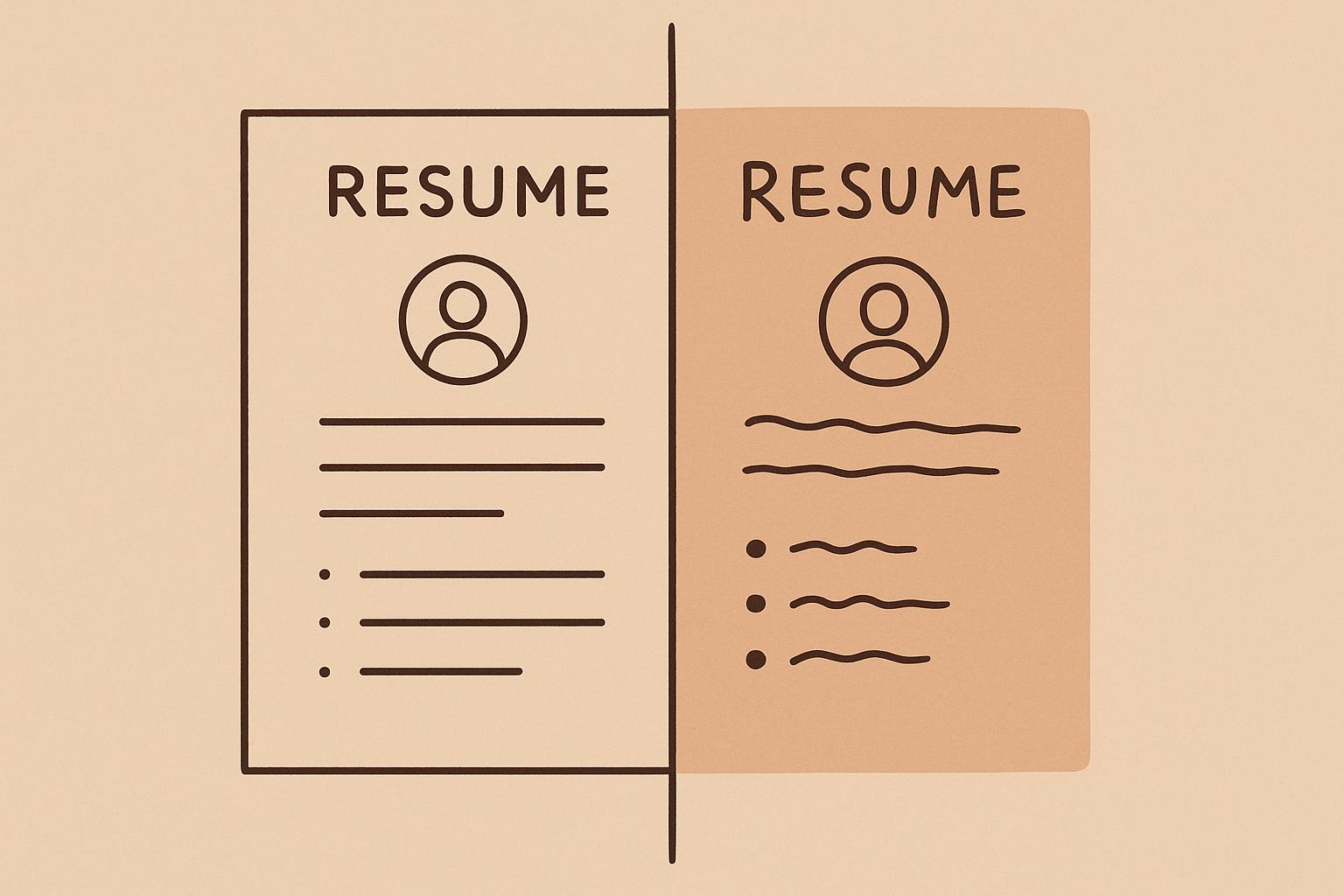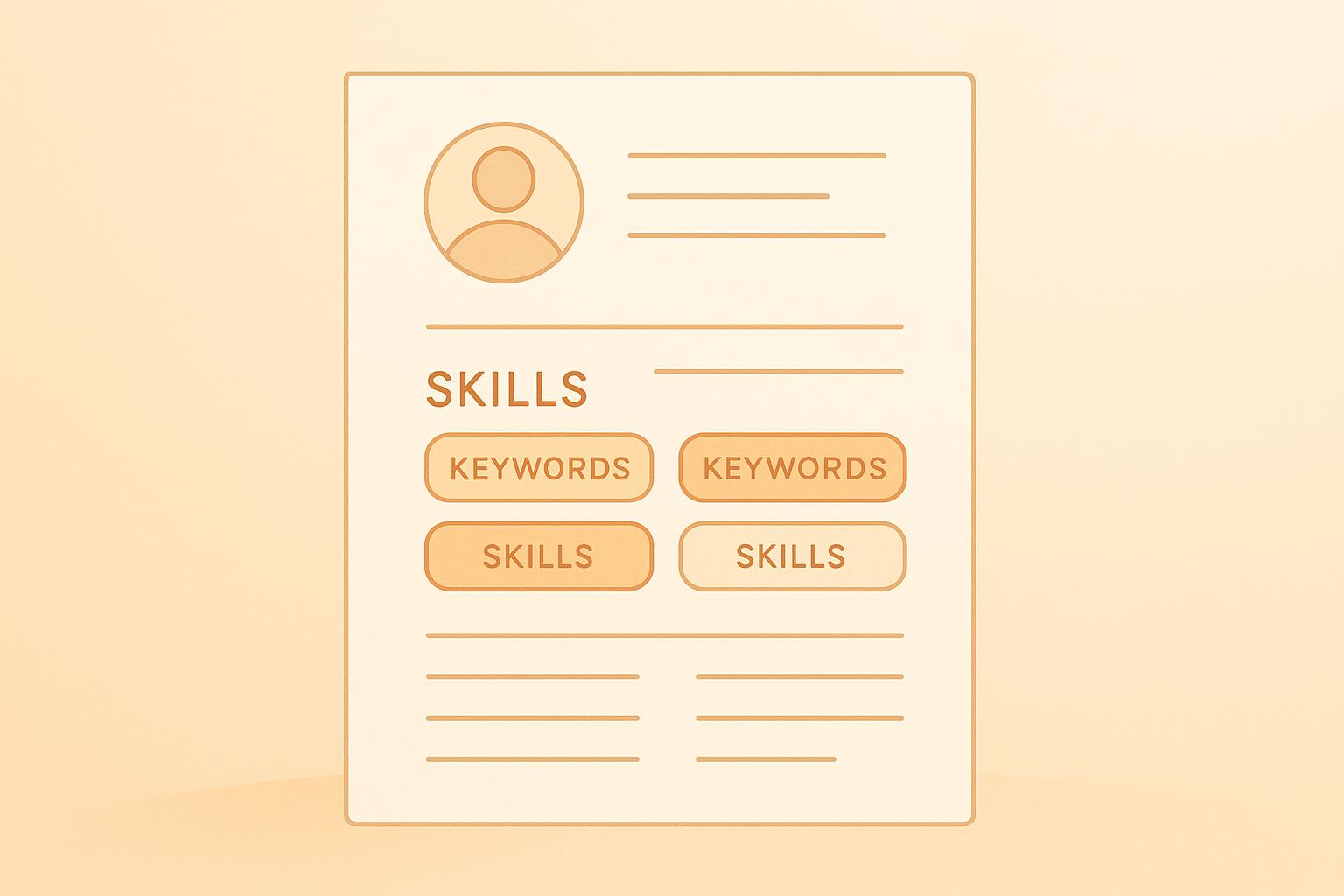AI skill testing platforms are reshaping hiring in 2025 by automating evaluations, reducing bias, and improving hiring efficiency. These tools are essential for technical roles, offering coding tests, proctoring, and integrations with HR systems. Here’s a quick overview of the top platforms:
- Codility: Best for coding challenges with strong anti-plagiarism features. Starts at $1,200/year.
- HackerRank: Offers 2,500+ coding tests across 45+ languages. Starts at $165/month.
- iMocha: Extensive skill library (3,000+ assessments) with smart analytics. Starts at $999/year.
- Vervoe: Focuses on task-based evaluations for various roles. Starts at $300 for 10 candidates.
- Mercer | Mettl: Enterprise-grade assessments with advanced proctoring. Custom pricing.
- Katalon: Specializes in automation testing for QA roles. Starts at $25/month.
- Applitools: Visual testing for UI/UX roles. Starts at $99/month.
These platforms streamline hiring, offering tailored solutions for technical and non-technical roles while improving decision-making with detailed insights.
Decoding Niche Recruitment: AI-Powered Skill Testing for Specialized Roles
1. Codility
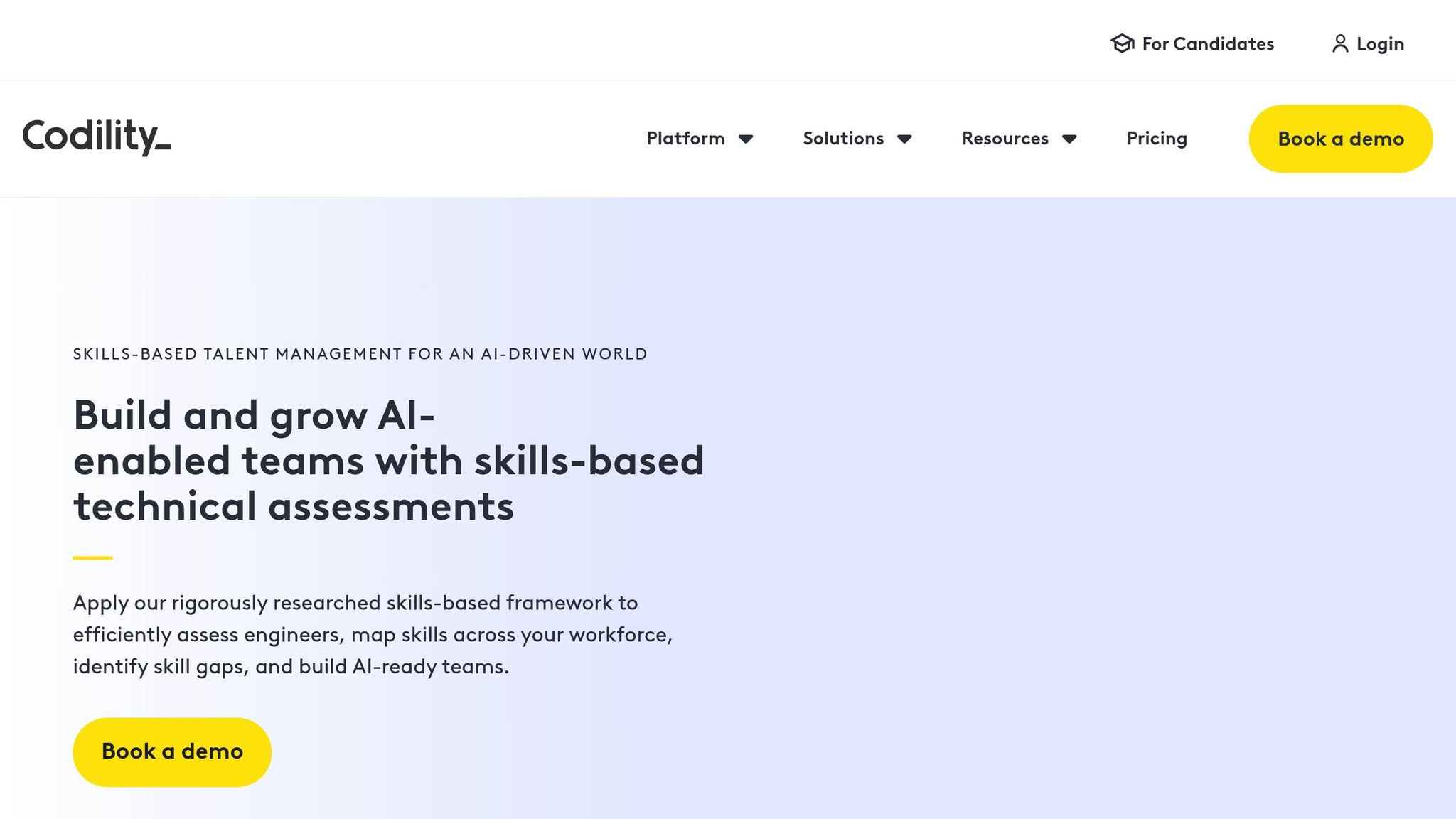
Codility is a platform tailored for developers, offering job-specific coding challenges that are trusted by some of the top tech employers. As AI continues to reshape technical hiring in 2025, tools like Codility have become essential for streamlining candidate evaluations.
AI-Driven Skill Evaluation
At the heart of Codility is its AI assistant, Cody, which helps recruiters create assessments and interpret results with greater ease. The platform's AI capabilities focus heavily on automating coding challenges and detecting plagiarism, ensuring fair and efficient evaluations.
Codility’s AI engine evaluates code efficiency and flags potential plagiarism, helping recruiters quickly filter out unqualified candidates early in the process. While its focus leans more on these automated features than on advanced scoring algorithms, it remains a trusted solution for delivering reliable assessments to companies worldwide.
Support for Technical Roles
Codility is designed to evaluate skills across a range of programming languages and frameworks, making it a strong choice for roles like software developers and data engineers. With a library of 1,200–1,800 coding questions covering various difficulty levels and domains, the platform ensures candidates are tested on practical, job-specific skills. Its real-world simulation environments further enhance the relevance of these assessments, mirroring actual tasks candidates would face on the job.
In addition to skill evaluation, Codility’s ability to integrate seamlessly with other recruitment tools adds to its appeal for tech hiring teams.
Integration Capabilities
Codility integrates smoothly with leading Applicant Tracking Systems (ATS), allowing candidate data to flow effortlessly between systems. This reduces manual data handling and provides hiring teams with a unified view of candidate progress, making the recruitment process more efficient.
Scalability for Enterprises
For companies managing high-volume hiring, Codility offers a scalable solution. Its architecture supports the simultaneous administration of thousands of tests while maintaining performance and ensuring test integrity through timed coding exercises and robust plagiarism detection. The platform’s advanced analytics and anti-cheating measures make it especially valuable for global tech companies with complex hiring pipelines.
2. HackerRank
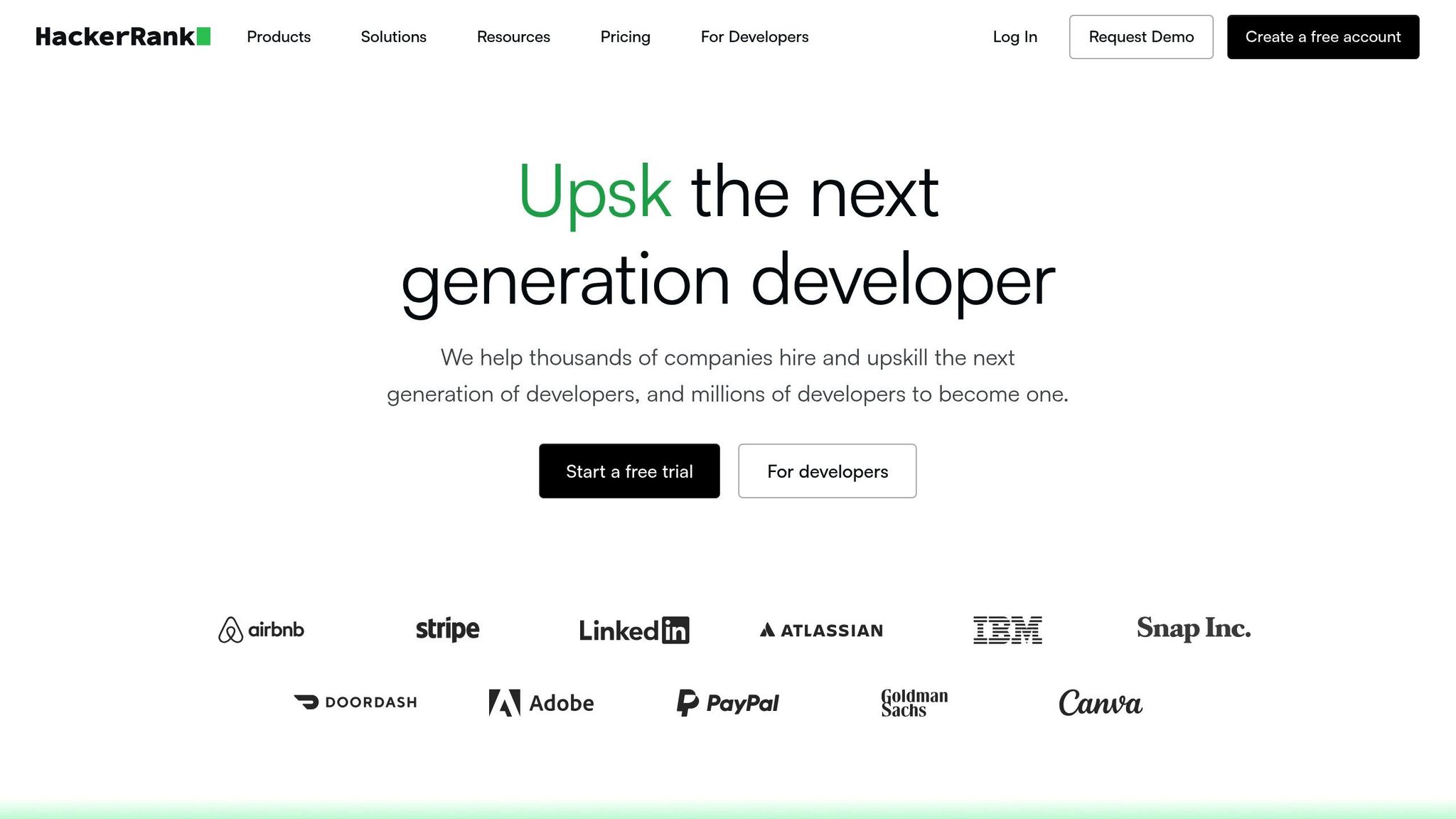
HackerRank stands out as a platform for technical assessments in software development and data science, offering over 2,500 coding challenges across 45+ programming languages.
AI-Powered Skill Assessment
The platform employs AI to evaluate code for quality, accuracy, and efficiency. This automation streamlines scoring, checks for plagiarism, and handles grading, significantly cutting down on manual work and reducing the potential for bias.
These AI capabilities make HackerRank a practical tool for assessing skills across various technical disciplines.
Tailored for Technical Roles
HackerRank provides assessments designed to reflect real-world projects, covering areas like algorithms, data structures, databases, and artificial intelligence. This makes it a great fit for screening candidates at both entry-level and advanced positions. Most assessments are designed to be completed in 60–90 minutes, making the evaluation process both thorough and time-efficient.
This approach aligns with the fast-changing demands of technical hiring as we move into 2025.
Integration with Recruitment Tools
HackerRank integrates smoothly with popular Applicant Tracking Systems (ATS) and HR platforms, allowing hiring teams to manage tests, monitor candidate progress, and review results without leaving their existing workflows. This reduces administrative tasks and keeps the hiring process efficient.
Built for Enterprise Needs
Designed to handle large-scale hiring, HackerRank can assess thousands of candidates simultaneously. Automated grading and detailed analytics provide hiring teams with the insights they need to make informed decisions. Plans start at $165 per month.
3. iMocha
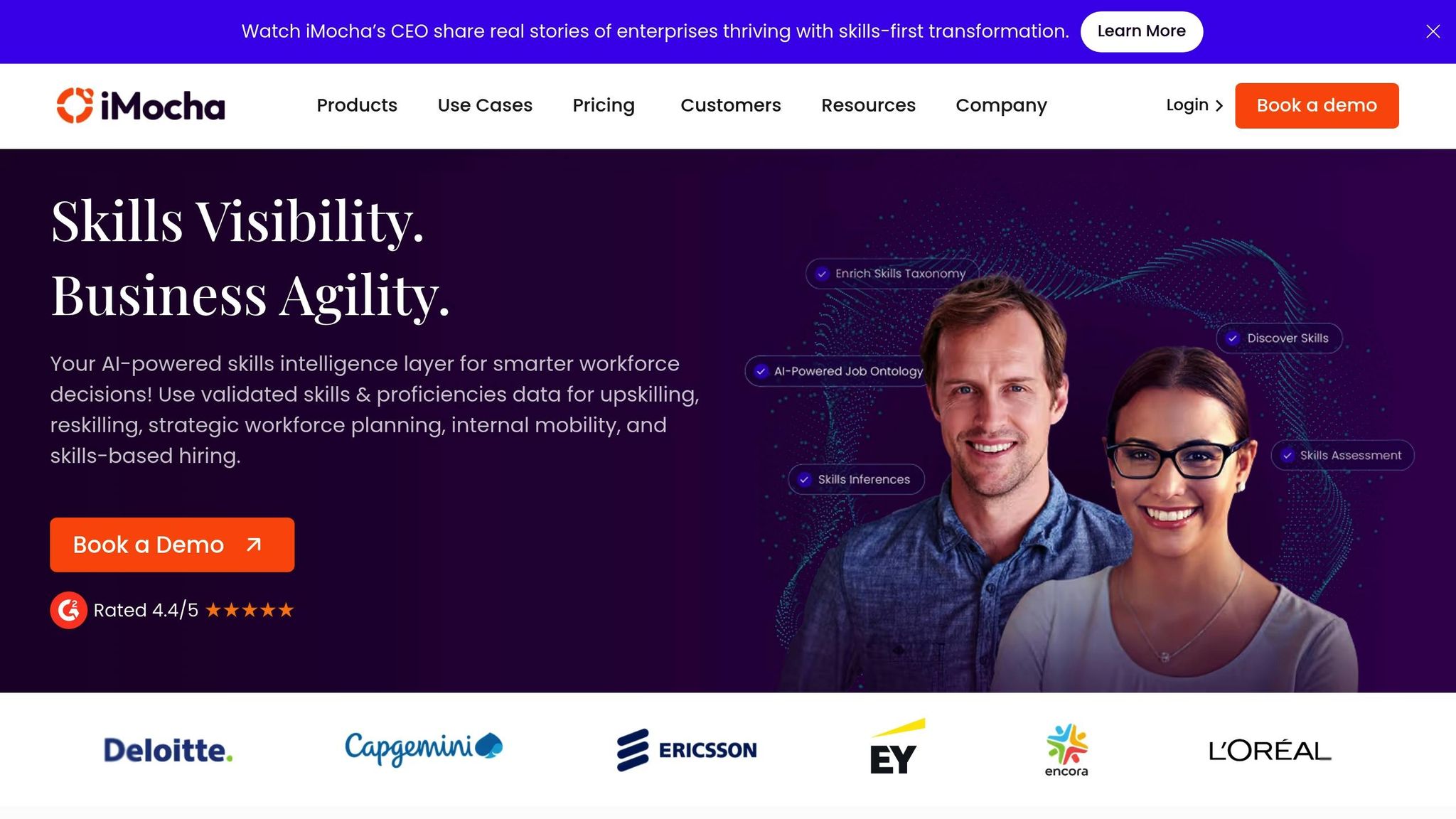
iMocha is a skills intelligence platform designed to provide AI-driven insights for hiring and talent development. With a library of over 3,000 technical and domain-specific assessments available in 2025, it offers a robust toolset for evaluating candidates. Combining its extensive assessment options with AI-powered analytics, iMocha enables precise and targeted evaluations.
AI-Driven Skill Evaluation
The platform uses AI to power smart skills matching and automated grading, achieving an impressive 95% accuracy in cheating detection. This is made possible through advanced algorithms that monitor candidate behavior with tools like intelligent video proctoring, facial recognition, and browser activity tracking. Suspicious activities during remote assessments are flagged in real time, ensuring the integrity of evaluations.
iMocha's analytics dashboard offers hiring teams detailed insights into candidate performance. These insights go beyond basic scores, providing a deeper understanding of competency gaps and strengths across technical domains. This skills intelligence helps organizations benchmark talent pools more effectively and make informed hiring decisions.
Support for Technical Roles
iMocha caters to a wide range of technical positions, from software engineering and IT consulting to roles in financial services and specialized engineering. Its flexibility makes it suitable for both generalist and highly specialized roles requiring specific domain expertise.
For example, financial services companies leverage iMocha during campus recruitment to reduce screening times while improving the quality of technical hires. IT consulting firms use its benchmarking capabilities to streamline shortlisting, making the hiring process faster and more efficient. These features align with the increasing use of AI to enhance technical hiring processes in 2025.
Integration Capabilities
iMocha seamlessly integrates with major Applicant Tracking Systems (ATS) through API connections, supporting workflows across talent acquisition, learning and development, and campus recruitment. This ensures that organizations can enhance their assessment processes without disrupting existing systems.
The integration allows hiring teams to manage assessments, monitor candidate progress, and analyze results - all within a single system. This streamlined approach eliminates the need to switch between platforms, simplifying recruitment workflows.
Scalability for Enterprises
Designed to handle high-volume hiring, iMocha offers custom enterprise packages tailored for large-scale recruitment and upskilling efforts. These packages include advanced analytics and flexible pricing, making the platform suitable for organizations managing thousands of assessments at once.
For smaller teams, pricing starts at $999 per year for the Basic plan and $1,199 per year for the Pro plan, with custom options available for larger enterprises.
4. Vervoe

Vervoe stands out by focusing on practical, job-related tasks instead of theoretical assessments. This approach allows employers to evaluate candidates based on how well they handle tasks they’d face on the job, making it easier to pinpoint individuals who can truly deliver in real workplace scenarios.
AI-Driven Skill Evaluation
Vervoe uses AI to automatically grade candidate responses to practical tasks, providing objective and consistent results. The platform’s algorithms assess both technical and soft skills, tailoring evaluations to specific roles like coding, customer support, or sales. Over time, its machine learning models improve accuracy by incorporating recruiter feedback and candidate data, saving hiring teams significant time on manual evaluations.
Support for Technical Roles
The platform excels in technical assessments, offering coding challenges, system design tasks, and troubleshooting scenarios for roles like software engineers, data scientists, and IT specialists. Employers can either customize tests or use pre-built templates to align assessments with job requirements. For example, front-end developer tests focus on JavaScript and React, while data science evaluations emphasize Python and machine learning. A mid-sized U.S. tech company used Vervoe to screen over 500 software engineering applicants in one hiring cycle, cutting their time-to-hire by 40% while improving candidate quality, as reflected in post-hire reviews. These tailored evaluations integrate smoothly with automated systems.
Integration Capabilities
Vervoe connects effortlessly with major Applicant Tracking Systems (like Greenhouse, Lever, and Workable) and HR platforms through APIs. This integration simplifies the recruitment process by automating data transfers, scheduling assessments, and reporting results. Hiring teams can manage candidate pipelines and assessment outcomes directly within their existing systems, reducing administrative tasks and improving efficiency.
Scalability for Enterprises
Built to handle large-scale hiring needs, Vervoe is perfect for enterprises managing mass recruitment or campus hiring. Automated grading and analytics make it easy to evaluate thousands of candidates, while enterprise features like role-based access controls allow team members to securely manage specific parts of the process. Pricing starts at a one-time fee of $300 for 10 candidates, with options to scale for larger organizations. The analytics dashboard provides detailed insights, including performance metrics, skill gap analysis, and benchmarking against industry standards - helping companies address immediate hiring needs while planning for the future.
sbb-itb-96bfd48
5. Mercer | Mettl
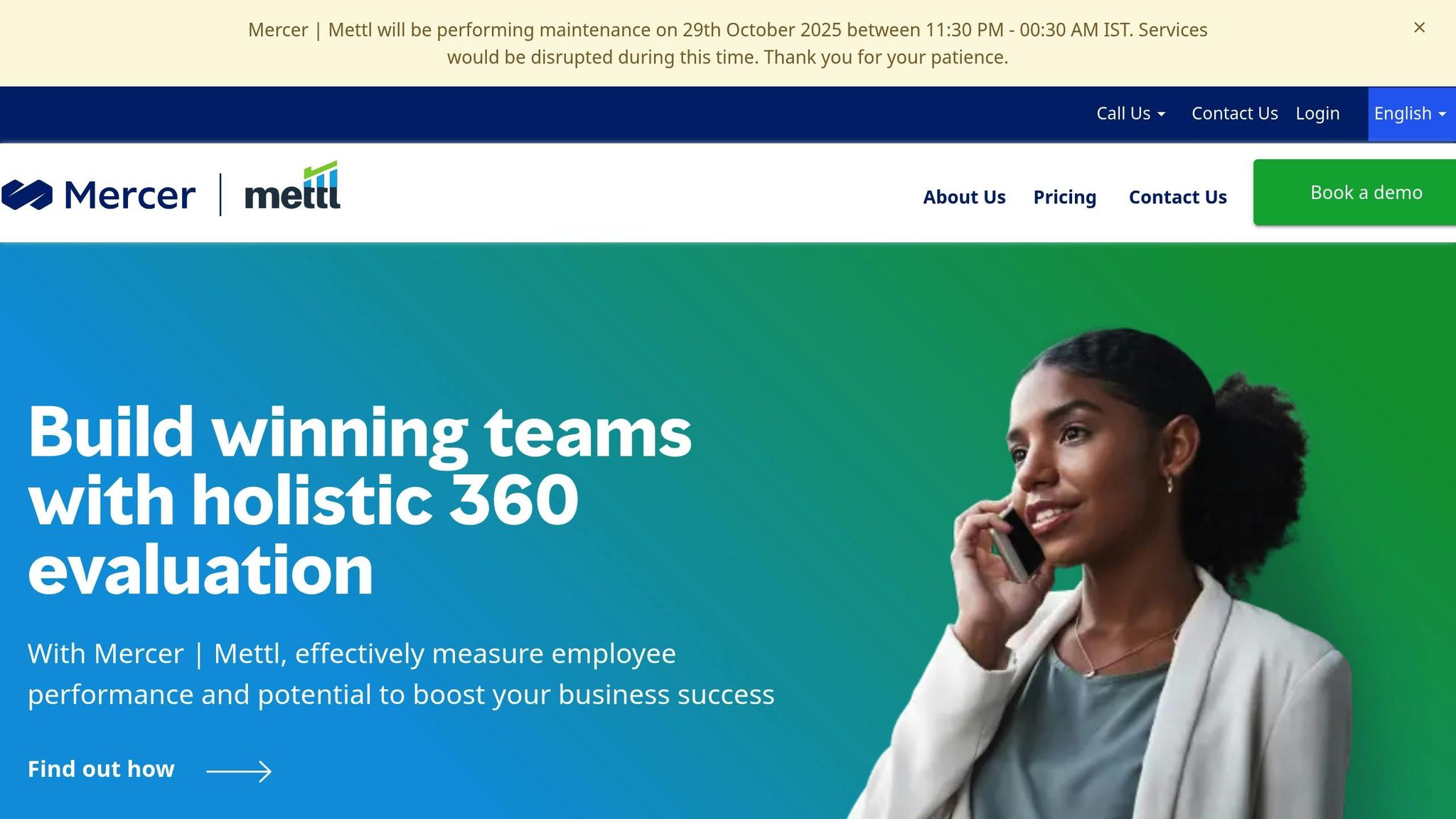
Mercer | Mettl showcases how AI is transforming enterprise assessments, offering solutions that cater to over 4,000 organizations worldwide, including Fortune 500 companies. Its advanced tools and features make it a powerful platform for modern evaluation needs.
AI-Driven Skill Evaluation
Mercer | Mettl simplifies the process of creating and scoring assessments while minimizing human bias. Its automated proctoring system uses AI to monitor behavior in real time. Features like facial recognition, browser lockdown, and keystroke analysis help identify suspicious activities, such as unusual eye movements, switching between browser tabs, or irregular typing patterns. This approach has been shown to reduce cheating by up to 95%.
Focus on Technical Roles
The platform is particularly effective for assessing technical skills, offering a library of over 2,000 pre-built tests. These cover a wide range of fields, including programming, data science, engineering, and IT. For more specialized needs, it supports custom test creation, allowing assessments to target specific skills like programming languages, development frameworks, database management, cloud technologies, and IT infrastructure. This flexibility makes it suitable for roles ranging from junior developers to senior architects.
Integration Capabilities
Mercer | Mettl integrates smoothly with major ATS, LMS, and HR platforms. Its API allows organizations to embed assessments directly into their existing workflows. For enterprises using systems like Workday or SAP SuccessFactors, the platform ensures that assessment results are automatically synced with candidate profiles and hiring dashboards, streamlining the hiring process.
Built for Enterprise Scalability
Designed to handle large-scale operations, Mercer | Mettl’s infrastructure supports thousands of simultaneous assessments. It offers a custom pricing model based on usage and feature requirements, making it adaptable for various recruitment needs. Whether it's campus hiring, lateral recruitment, or filling specialized technical positions, the platform is built to manage high volumes efficiently.
6. Katalon
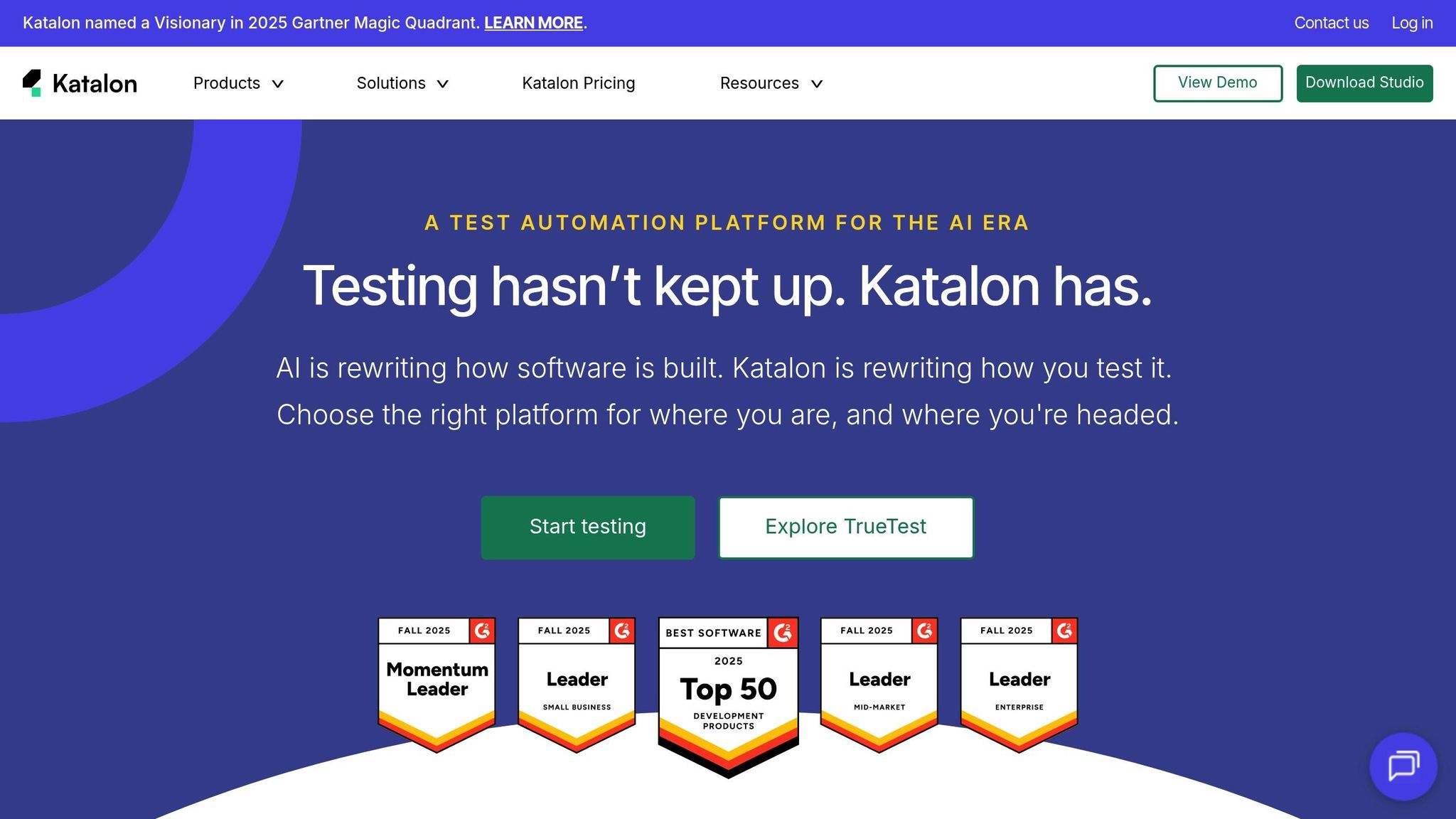
Katalon, widely recognized for its test automation capabilities, has broadened its offerings to include AI-powered assessments of software testing and automation skills. This makes it a valuable tool for evaluating the expertise needed in quality assurance, automation testing, and DevOps roles.
AI-Driven Skill Evaluation
Katalon leverages advanced AI to examine test workflows by analyzing test scripts, logs, and candidate interactions. It automates the grading of complex test cases, identifies logic errors, and evaluates testing efficiency. Additionally, it provides actionable feedback, benefiting both recruiters and candidates by highlighting areas of improvement.
Tailored for Technical Roles
The platform focuses on assessing practical skills essential for QA, automation, and DevOps positions. It evaluates proficiency in key programming languages like Java, Groovy, and Python, along with expertise in test automation frameworks, API testing, and integration with continuous integration/continuous delivery (CI/CD) pipelines.
Integration Features
Katalon integrates effortlessly with popular applicant tracking systems (ATS) and HR tools through APIs and native connectors. Its compatibility with CI/CD pipelines enables candidates to work in realistic testing scenarios within actual development environments, showcasing their hands-on skills. This level of integration aligns with what’s expected from top-tier AI testing platforms.
Built for Enterprise Needs
Katalon is designed to handle large-scale recruitment demands. Its cloud-based infrastructure streamlines processes like bulk candidate invitations, automated test scheduling, and centralized analytics. For example, a major U.S. financial services company reduced its screening time by 50% by automating test case evaluations and integrating Katalon with their ATS. The platform’s detailed analytics also help track performance metrics, pinpoint skill gaps, and support data-driven hiring decisions - all while adhering to U.S. data privacy laws like the CCPA.
7. Applitools
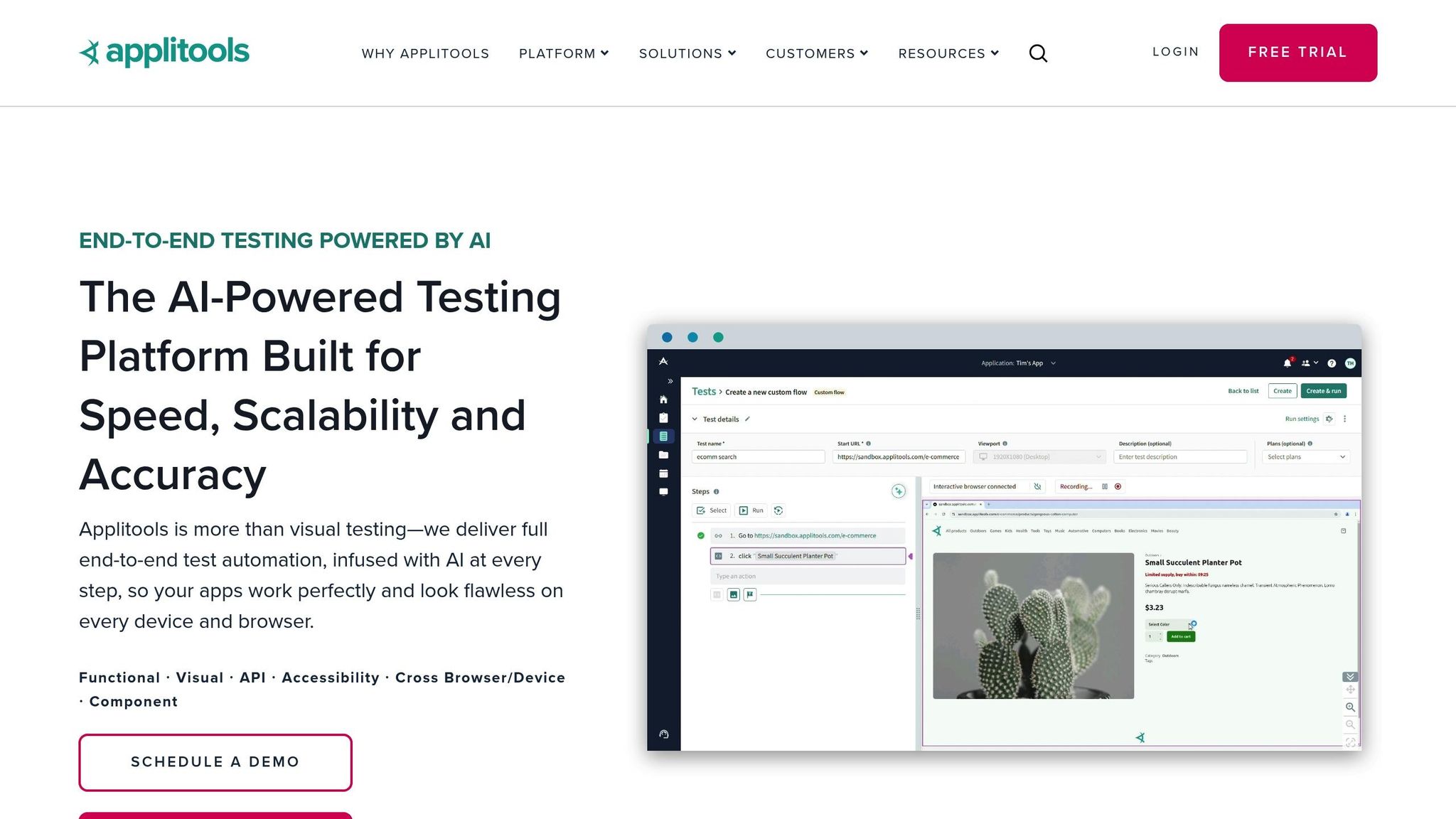
Applitools is a specialized platform powered by AI, designed for visual testing and UI quality assurance. While its primary focus has been on automated visual testing in software development, it has also become a valuable tool for evaluating technical skills, especially for roles requiring sharp visual precision. Here's how Applitools uses AI to enhance visual testing and skill assessment.
AI-Powered Visual Testing
Applitools employs advanced Visual AI technology to automatically spot visual bugs, user interface regressions, and layout inconsistencies that might escape human testers. By using computer vision and machine learning algorithms, the platform compares application UI screenshots against baseline images, identifying even the smallest discrepancies across various browsers, devices, and screen sizes. This approach significantly reduces maintenance efforts - by as much as 90% - through automated baseline updates.
Tailored for Technical Roles
The platform is particularly well-suited for evaluating candidates in front-end development, QA engineering, UI/UX design, and roles like Software Development Engineers in Test (SDETs). Companies can design assessments that challenge candidates to identify and resolve visual bugs in real-world scenarios. This hands-on, role-specific evaluation aligns with the growing demand for practical skill assessments in technical hiring.
Seamless Integration
Applitools integrates effortlessly into existing development workflows, working with popular frameworks such as Selenium, Cypress, Appium, Jest, WebdriverIO, and Playwright. It also connects with CI/CD tools like Jenkins, GitHub Actions, Azure DevOps, and CircleCI. These integrations make it easy to embed visual testing into technical screening processes, offering a comprehensive view of a candidate's coding and testing abilities. Additionally, its scalable cloud infrastructure supports thousands of tests running simultaneously, ensuring efficiency in high-volume assessments.
Enterprise-Ready Scalability
With a user base exceeding 300,000 and over 700 enterprise customers worldwide, Applitools is built to handle large-scale technical hiring needs. Its cloud-based system enables thousands of parallel test executions, making it ideal for organizations conducting mass screenings or continuous assessments. Teams using Applitools have reported a 50% increase in test coverage and a 30–50% reduction in release cycles. The platform also offers advanced features like analytics, batch processing, and SOC 2 Type II compliance, meeting enterprise-level standards in the U.S.
Pricing starts with a free tier for individual users, while professional plans begin at around $99 per month. Custom enterprise pricing is available, tailored to usage and integration requirements.
Platform Comparison Table
This table provides a clear side-by-side comparison of each platform, highlighting their strengths, target roles, and specific features.
Platform Specializations and Target Roles
- Codility: Focused on technical coding challenges for software developers and engineers.
- HackerRank: Offers technical screening for developers and data scientists.
- iMocha: Provides diverse skills assessments for IT, finance, engineering, and campus hiring.
- Vervoe: Validates real-world tasks for technical, sales, customer service, and creative roles.
- Mercer | Mettl: Delivers enterprise-grade assessments for technical, managerial, and behavioral positions.
- Katalon: Specializes in automation testing for QA engineers and testing professionals.
- Applitools: Focuses on visual AI testing for front-end developers, QA engineers, and UI/UX designers.
| Platform | Starting Price (USD) | Core Strength | Best For | Limitation |
|---|---|---|---|---|
| Codility | $1,200/year | Real-world coding simulations | Software developers | Limited to technical roles |
| HackerRank | $165/month | Global talent benchmarking | Technical screening at scale | Less emphasis on soft skills |
| iMocha | $999/year | Largest skills library | Versatile hiring needs | Complex custom question interface |
| Vervoe | $300 (10 candidates) | AI-driven candidate ranking | Real-world skills validation | May lack technical depth |
| Mercer | Mettl | Custom pricing | Enterprise analytics | Large-scale assessments | Higher complexity |
| Katalon | $25/month | Test automation | QA and testing roles | Steep learning curve for beginners |
| Applitools | $99/month | Visual AI testing | UI/UX validation | Limited to visual testing |
Integration and Workflow Capabilities
When it comes to integration, Codility and HackerRank stand out with their robust ATS integration and API support, making workflow automation seamless. iMocha also offers strong API connectivity paired with advanced analytics. Vervoe provides white-label customization alongside standard ATS integration, while Mercer | Mettl connects efficiently with enterprise HR systems. Platforms like Katalon and Applitools focus on integration with CI/CD tools and development frameworks, catering to software development workflows. These integrations are essential for speeding up hiring processes and ensuring smooth operations.
Pricing Models and Value Propositions
Pricing structures vary widely across platforms. Affordable options like Katalon ($25/month) and Vervoe (usage-based pricing starting at $300 for 10 candidates) cater to smaller budgets. Mid-range platforms such as HackerRank and Applitools offer monthly subscriptions, while Codility and iMocha follow annual pricing models. For large-scale needs, Mercer | Mettl offers custom pricing to accommodate enterprise-level requirements.
Performance and Security
All platforms prioritize performance and security, employing advanced AI proctoring to maintain test integrity. These measures have led to efficiency gains, with organizations reporting a 30-60% reduction in screening time and improvements in hire quality. Each platform has its niche - Applitools excels in visual testing, while broader platforms like iMocha cover a wide range of skill assessments, catering to diverse hiring needs.
Conclusion
AI-powered skill testing platforms have reshaped how organizations in the US evaluate talent in 2025. These tools provide fast, unbiased assessments that significantly reduce hiring timelines. Their widespread adoption by enterprises underscores their ability to perform effectively at scale.
The impact on hiring efficiency is clear. Research shows a 25% boost in diversity hiring and notable decreases in time-to-hire.
But the benefits extend beyond the companies using them. For job seekers, these platforms offer a fresh approach to career growth. They provide detailed feedback, precise skill evaluations, and opportunities to demonstrate abilities that go beyond the limits of a traditional resume. Candidates can showcase both technical and soft skills through tailored assessments, which can then be shared with multiple employers - boosting visibility in competitive markets. Additionally, many platforms include personalized upskilling suggestions, helping professionals stay competitive in industries that are constantly evolving.
Looking ahead, advancements in AI customization and real-time feedback are set to make these assessments even more dynamic and adaptable. These enhancements build on the strengths already outlined in our comparison of the top platforms.
The seven platforms we’ve reviewed set the benchmark for AI-driven skill testing today. Whether you’re a startup seeking budget-friendly screening solutions or a large organization requiring in-depth evaluations, these tools empower smarter, faster, and fairer hiring processes in 2025 and beyond.
FAQs
How do AI-powered skill testing platforms help reduce bias in hiring?
AI-driven skill testing platforms are transforming hiring by shifting the focus to objective, skill-based evaluations instead of relying on subjective elements like resumes or traditional interviews. By using standardized tests and algorithms, these tools assess candidates' technical abilities uniformly, ensuring everyone is evaluated on the same playing field.
To take it a step further, many platforms offer features like anonymized assessments and blind scoring, which help reduce unconscious bias. This approach promotes a fairer and more impartial hiring process, allowing employers to zero in on talent based purely on skills and merit.
What should you look for in an AI platform to test technical skills for a specific role?
When choosing an AI skill testing platform, it’s important to pick tools that match the specific needs of the role you’re hiring for. Features like customizable assessments, detailed performance analytics, and automation can help make the evaluation process smoother and more precise.
For instance, platforms with centralized tracking and insights into skill gaps can save you time and help you make better decisions. Opting for tools with intuitive dashboards and strong data management capabilities can also make the testing process more seamless and effective.
How do these platforms maintain the security and fairness of remote skill assessments?
JobSwift.AI takes security and data protection seriously, implementing strong safeguards to ensure user safety. One standout feature is its job scam protection, which actively detects and flags suspicious job postings, helping users avoid potential scams. The platform also refrains from creating fake resumes or submitting applications on behalf of users. This approach ensures that individuals retain full control over their personal information and job search process. Together, these measures provide a reliable and secure space for job seekers.
